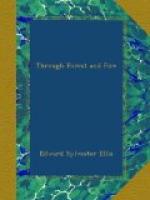Parallel to the stream, for a distance of several rods or so, were a number of imprints in the yielding earth, which the first glance showed were made by some large animal.
“It must have been a dog,” ventured the teacher, who had little practical knowledge of the animals of the wood.
Mr. Kilgore shook his head.
“It was a bear; there can be no mistake about it. Mr. Marston was right; it was the track of a similar animal which he saw last March.”
“You are not mistaken, Mr. Kilgore?”
The farmer answered impatiently:
“I have hunted bears too often to be mistaken; I can tell their trail among a hundred others, and the one which went along here a little while ago was one of the largest of his kind.”
CHAPTER IX.
THE LITTLE WANDERER.
Although Nellie Ribsam was only eight years old at the time she was lost in the big woods, yet the results of the training received from her sensible father and mother showed themselves in a marked degree on that memorable occasion.
She had been taught, as was her brother, that under heaven she must rely upon herself to get forward in the world. Nick was rarely if ever allowed to extend her a helping hand in her lessons, and she was given to understand that whatever was possible for her to do must be done without the aid of any one.
As for sitting down and crying when in trouble, without making any effort to help herself, she knew better than to try that when either her father or mother were likely to find it out.
Her intention, when she left school that afternoon before the session closed, was to keep on in the direction of Dunbarton until she met Nick returning.
She turned off at the forks, and did not lessen her gait until she reached the woods. Her rapid walking caused her to feel quite warm, and the cool shade of the woods was refreshing.
She began wandering aimlessly forward, swinging her hat in her hand, singing snatches of school songs, and feeling just as happy as a little girl can feel who is in bounding health, high spirits, and without an accusing conscience.
It was not the time of year for flowers, and Nellie knew better than to look for any. They had drooped and died long ago; but some of the leaves were turning on the trees, and they gave a peculiar beauty to the autumnal forest.
At intervals she caught sight of the cleanly, symmetrical maple, with some of its leaves turning a fiery red and looking like flecks of flame through the intervening vegetation. At the least rustling of the wind some of the leaves came fluttering downward as lightly as flakes of snow; the little brown squirrel scampered up the shaggy trunks and out upon the limbs, where, perching on his hind legs, he peeped mischievously down at the girl, as if inviting her to play hide-and-seek with him; now and then a rabbit, fat and awkward from his gluttony on the richness around him, jumped softly a few steps, then munched rapidly with his jaws, flapped his long silken ears, looked slyly around with his big, pretty eyes, and, as the girl made a rush toward him, he was off like a shot.




